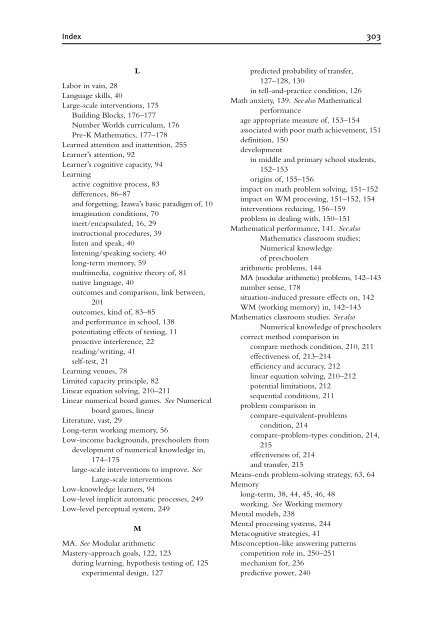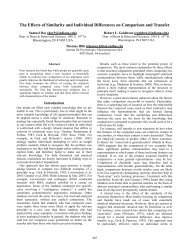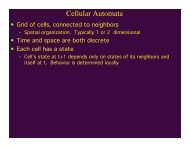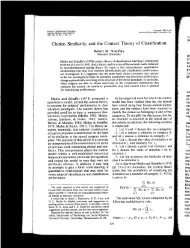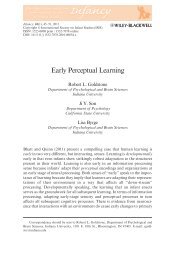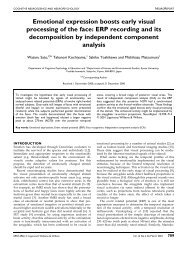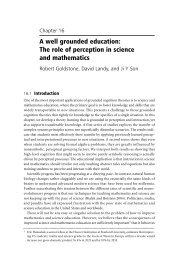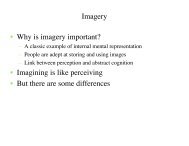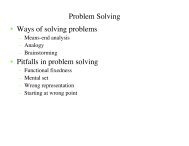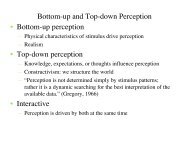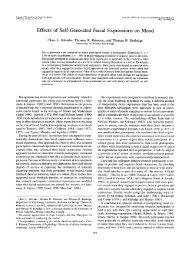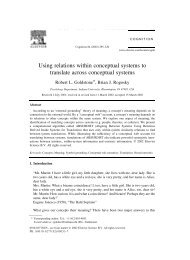Index 303LLabor in vain, 28Language skills, 40Large-scale interventions, 175Building Blocks, 176–177Number Worlds curriculum, 176Pre-K Ma<strong>the</strong>matics, 177–178Learned attention <strong>and</strong> inattention, 255Learner’s attention, 92Learner’s cognitive capacity, 94Learningactive cognitive process, 83differences, 86–87<strong>and</strong> forgetting, Izawa’s basic paradigm <strong>of</strong>, 10imagination conditions, 70inert/encapsulated, 16, 29instructional procedures, 39listen <strong>and</strong> speak, 40listening/speaking society, 40long-term memory, 59multimedia, cognitive <strong>the</strong>ory <strong>of</strong>, 81native language, 40outcomes <strong>and</strong> comparison, link between,201outcomes, kind <strong>of</strong>, 83–85<strong>and</strong> performance in school, 138potentiating effects <strong>of</strong> testing, 11proactive interference, 22reading/writing, 41self-test, 21Learning venues, 78Limited capacity principle, 82Linear equation solving, 210–211Linear numerical board games. See Numericalboard games, linearLiterature, vast, 29Long-term working memory, 56Low-income backgrounds, preschoolers fromdevelopment <strong>of</strong> numerical knowledge in,174–175large-scale interventions to improve. SeeLarge-scale interventionsLow-knowledge learners, 94Low-level implicit automatic processes, 249Low-level perceptual system, 249MMA. See Modular arithmeticMastery-approach goals, 122, 123during <strong>learning</strong>, hypo<strong>the</strong>sis testing <strong>of</strong>, 125experimental design, 127predicted probability <strong>of</strong> transfer,127–128, 130in tell-<strong>and</strong>-practice condition, 126Math anxiety, 139. Seealso Ma<strong>the</strong>maticalperformanceage appropriate measure <strong>of</strong>, 153–154associated with poor math achievement, 151definition, 150developmentin middle <strong>and</strong> primary school students,152–153origins <strong>of</strong>, 155–156impact on math problem solving, 151–152impact on WM processing, 151–152, 154interventions reducing, 156–159problem in dealing with, 150–151Ma<strong>the</strong>matical performance, 141. SeealsoMa<strong>the</strong>matics classroom studies;Numerical knowledge<strong>of</strong> preschoolersarithmetic problems, 144MA (modular arithmetic) problems, 142–143number sense, 178situation-induced pressure effects on, 142WM (working memory) in, 142–143Ma<strong>the</strong>matics classroom studies. SeealsoNumerical knowledge <strong>of</strong> preschoolerscorrect method comparison incompare methods condition, 210, 211effectiveness <strong>of</strong>, 213–214efficiency <strong>and</strong> accuracy, 212linear equation solving, 210–212potential limitations, 212sequential conditions, 211problem comparison incompare-equivalent-problemscondition, 214compare-problem-types condition, 214,215effectiveness <strong>of</strong>, 214<strong>and</strong> transfer, 215Means-ends problem-solving strategy, 63, 64Memorylong-term, 38, 44, 45, 46, 48working. See Working memoryMental models, 238Mental processing systems, 244Metacognitive strategies, 41Misconception-like answering patternscompetition role in, 250–251mechanism for, 236predictive power, 240
304 Indexscientific questions, 234–235undergraduate physics students, 242–243Misconceptions <strong>and</strong> explicit thinking, 259Modality effect, 67–68Modality principle, 97–98, 98Modular arithmetic, 142Motions <strong>of</strong> objects, student responses to, 249Motivation, 82Motivational constraints on transfer scenario,118Motivational factors, 111Motivational processes <strong>and</strong> knowledge transfer,116Muller-Lyer illusion, 245Multimedia assessment, science <strong>of</strong>instructional effectivenessexperimental comparisons <strong>of</strong>, 85–86<strong>learning</strong>, differences, 86–87<strong>learning</strong> outcomes, kind <strong>of</strong>, 83–85Multimedia instruction, 101definition <strong>of</strong>, 78future <strong>of</strong>, 102–103goals <strong>of</strong>, 87–89historical overview <strong>of</strong>, 79–80promise/challenge <strong>of</strong>, 79reducing extraneous processing,evidence-based techniques for, 90coherence principle, 91for fostering generative processing,98–102generation principle, 100–101for managing essential processing, 95modality principle, 97–98multimedia principle, 99–100personalization principle, 101–102pretraining principle, 96–97redundancy principle, 92–93segmenting principle, 96signaling principle, 91–92spatial contiguity principle, 93–94temporal contiguity principle, 94–95voice principle, 102triarchic <strong>the</strong>ory <strong>of</strong>, 87Multimedia <strong>learning</strong>cognitive processes, 82eye tracking in, 257principles <strong>of</strong> cognitive science, 80–82representations, 83Multimedia presentations, 99Multimedia principle, 79, 99–100Multimedia research, future <strong>of</strong>, 103Multiple choice categorization task, 282NNatural information processing principles, 44Negative attitudes toward ma<strong>the</strong>matics. SeeMath anxietyNumber line estimationadvantages, 180goal <strong>of</strong>, 179logarithmic pattern <strong>of</strong> estimates on, 181means <strong>and</strong> variability on, 180Number sense construct, 178Number Worlds curriculum, 176Numerical board games, linearbenefits assessment, 184–189ability to learn arithmetic problems, 186children’s ma<strong>the</strong>matical knowledge, 185generality over time, 185–186linear <strong>and</strong> circular board games,186–187number line estimation, 185o<strong>the</strong>r numerical experiences, 187–189in preschoolers from low-incomebackgrounds, 184–185representational mapping hypo<strong>the</strong>sistesting, 186experiment testing <strong>of</strong>, 183–184Numerical knowledge <strong>of</strong> preschoolersdevelopment <strong>of</strong>, 174–175differences in, 172early ma<strong>the</strong>matical abilities, 173–174from economic backgrounds, 175game intervention for improving.See Game interventionlarge-scale interventions for improving, 175Building Blocks, 176–177Number Worlds curriculum, 176Pre-K Ma<strong>the</strong>matics, 177–178as mental number line, 178–179number sense, 178<strong>the</strong>oretical analysis <strong>of</strong>core competence, 178individual <strong>and</strong> age-related differences,relation between, 182–183mental number line, 179nonverbal representations <strong>of</strong> quantity,179number line estimation, 179–181number sense, 178numerical magnitude representations <strong>and</strong>arithmetic knowledge, relationbetween, 182verification tasks, 182
- Page 3 and 4:
Series EditorBRIAN H. ROSSBeckman I
- Page 5 and 6:
Academic Press is an imprint of Els
- Page 7 and 8:
viContents3. Science of Multimedia
- Page 9 and 10:
This Page Intentionally Left Blank
- Page 11 and 12:
xContributorsHenry L. Roediger, III
- Page 13 and 14:
xiiPrefaceand there has been much e
- Page 15 and 16:
xivPrefaceInterventions for improvi
- Page 17 and 18:
2 Henry L. Roediger et al.delayed t
- Page 19 and 20:
4 Henry L. Roediger et al.an indire
- Page 21 and 22:
6 Henry L. Roediger et al.[(Figure_
- Page 23 and 24:
8 Henry L. Roediger et al.[(Figure_
- Page 25 and 26:
10 Henry L. Roediger et al.seems so
- Page 27 and 28:
12 Henry L. Roediger et al.interpre
- Page 29 and 30:
14 Henry L. Roediger et al.Table 2
- Page 31 and 32:
16 Henry L. Roediger et al.improved
- Page 33 and 34:
18 Henry L. Roediger et al.this mat
- Page 35 and 36:
20 Henry L. Roediger et al.length o
- Page 37 and 38:
22 Henry L. Roediger et al.9. BENEF
- Page 39 and 40:
24 Henry L. Roediger et al.subjects
- Page 41 and 42:
26 Henry L. Roediger et al.feedback
- Page 43 and 44:
28 Henry L. Roediger et al.supporti
- Page 45 and 46:
30 Henry L. Roediger et al.of some
- Page 47 and 48:
32 Henry L. Roediger et al.Benefit
- Page 49 and 50:
34 Henry L. Roediger et al.Hasher,
- Page 51 and 52:
36 Henry L. Roediger et al.Son, L.
- Page 53 and 54:
38 John Sweller1. INTRODUCTIONCogni
- Page 55 and 56:
40 John Sweller‘‘baby-talk.’
- Page 57 and 58:
42 John Swellerof cognitive or meta
- Page 59 and 60:
44 John SwellerTable 1Natural Infor
- Page 61 and 62:
46 John Swellerconfigurations. A ch
- Page 63 and 64:
48 John Swellerreproduction results
- Page 65 and 66:
50 John Swellerto mutation, without
- Page 67 and 68:
52 John Swellerusing a complex or,
- Page 69 and 70:
54 John SwellerThe human cognitive
- Page 71 and 72:
56 John Swellerepigenetic system ha
- Page 73 and 74:
58 John SwellerWe can determine lev
- Page 75 and 76:
60 John Swellerthan memorizing the
- Page 77 and 78:
62 John SwellerTable 2EffectVariabi
- Page 79 and 80:
64 John Swelleroccurs when students
- Page 81 and 82:
66 John Sweller3.3.3. The Split-Att
- Page 83 and 84:
68 John Swellermerely restates the
- Page 85 and 86:
70 John SwellerThe expertise revers
- Page 87 and 88:
72 John Swellerobtained a reverse m
- Page 89 and 90:
74 John Swelleractivities that othe
- Page 91 and 92:
76 John SwellerRenkl, A. (2005). Th
- Page 93 and 94:
78 Richard E. Mayercognitive theory
- Page 95 and 96:
80 Richard E. Mayerpictures beginni
- Page 97 and 98:
82 Richard E. MayerThe dualchannelp
- Page 99 and 100:
84 Richard E. Mayerlearner selects
- Page 101 and 102:
86 Richard E. MayerRosenthal, Rosno
- Page 103 and 104:
88 Richard E. MayerGenerative proce
- Page 105 and 106:
90 Richard E. Mayer4.2. Evidence-ba
- Page 107 and 108:
92 Richard E. Mayersituation could
- Page 109 and 110:
94 Richard E. Mayer(Moreno & Mayer,
- Page 111 and 112:
96 Richard E. Mayer4.3.1. Segmentin
- Page 113 and 114:
98 Richard E. Mayerpresenting the w
- Page 115 and 116:
100 Richard E. MayerThe multimedia
- Page 117 and 118:
102 Richard E. Mayergame in industr
- Page 119 and 120:
104 Richard E. MayerClark, R. C., &
- Page 121 and 122:
106 Richard E. MayerMayer, R. E., &
- Page 123 and 124:
108 Richard E. MayerSweller, J. (19
- Page 125:
110 Timothy J. Nokes and Daniel M.
- Page 128 and 129:
Incorporating Motivation into a The
- Page 130 and 131:
Incorporating Motivation into a The
- Page 132 and 133:
Incorporating Motivation into a The
- Page 134 and 135:
Incorporating Motivation into a The
- Page 136 and 137:
Incorporating Motivation into a The
- Page 138 and 139:
Incorporating Motivation into a The
- Page 140 and 141:
Incorporating Motivation into a The
- Page 142 and 143:
Incorporating Motivation into a The
- Page 144 and 145:
Incorporating Motivation into a The
- Page 146 and 147:
Incorporating Motivation into a The
- Page 148 and 149:
Incorporating Motivation into a The
- Page 150 and 151:
Incorporating Motivation into a The
- Page 152 and 153:
CHAPTERFIVEOn the Interplay of Emot
- Page 154 and 155:
Implications for Enhancing Academic
- Page 156 and 157:
Implications for Enhancing Academic
- Page 158 and 159:
Implications for Enhancing Academic
- Page 160 and 161:
Implications for Enhancing Academic
- Page 162 and 163:
Implications for Enhancing Academic
- Page 164 and 165:
Implications for Enhancing Academic
- Page 166 and 167:
Implications for Enhancing Academic
- Page 168 and 169:
Implications for Enhancing Academic
- Page 170 and 171:
Implications for Enhancing Academic
- Page 172 and 173:
Implications for Enhancing Academic
- Page 174 and 175:
Implications for Enhancing Academic
- Page 176 and 177:
Implications for Enhancing Academic
- Page 178 and 179:
Implications for Enhancing Academic
- Page 180 and 181:
Implications for Enhancing Academic
- Page 182 and 183:
Implications for Enhancing Academic
- Page 184 and 185:
Implications for Enhancing Academic
- Page 186 and 187:
CHAPTERSIXThere Is Nothing So Pract
- Page 188 and 189:
There Is Nothing So Practical as a
- Page 190 and 191:
There Is Nothing So Practical as a
- Page 192 and 193:
There Is Nothing So Practical as a
- Page 194 and 195:
There Is Nothing So Practical as a
- Page 196 and 197:
There Is Nothing So Practical as a
- Page 198 and 199:
There Is Nothing So Practical as a
- Page 200 and 201:
There Is Nothing So Practical as a
- Page 202 and 203:
There Is Nothing So Practical as a
- Page 204 and 205:
There Is Nothing So Practical as a
- Page 206 and 207:
There Is Nothing So Practical as a
- Page 208 and 209:
There Is Nothing So Practical as a
- Page 210 and 211:
There Is Nothing So Practical as a
- Page 212 and 213:
There Is Nothing So Practical as a
- Page 214 and 215:
CHAPTERSEVENThe Power of Comparison
- Page 216 and 217:
The Power of Comparison in Learning
- Page 218 and 219:
The Power of Comparison in Learning
- Page 220 and 221:
The Power of Comparison in Learning
- Page 222 and 223:
The Power of Comparison in Learning
- Page 224 and 225:
The Power of Comparison in Learning
- Page 226 and 227:
The Power of Comparison in Learning
- Page 228 and 229:
The Power of Comparison in Learning
- Page 230 and 231:
The Power of Comparison in Learning
- Page 232 and 233:
The Power of Comparison in Learning
- Page 234 and 235:
The Power of Comparison in Learning
- Page 236 and 237:
The Power of Comparison in Learning
- Page 238 and 239:
The Power of Comparison in Learning
- Page 240 and 241:
The Power of Comparison in Learning
- Page 242 and 243:
CHAPTEREIGHTThe Ubiquitous Patterns
- Page 244 and 245:
The Ubiquitous Patterns of Incorrec
- Page 246 and 247:
The Ubiquitous Patterns of Incorrec
- Page 248 and 249:
The Ubiquitous Patterns of Incorrec
- Page 250 and 251:
The Ubiquitous Patterns of Incorrec
- Page 252 and 253:
The Ubiquitous Patterns of Incorrec
- Page 254 and 255:
The Ubiquitous Patterns of Incorrec
- Page 256 and 257:
The Ubiquitous Patterns of Incorrec
- Page 258 and 259:
The Ubiquitous Patterns of Incorrec
- Page 260 and 261:
The Ubiquitous Patterns of Incorrec
- Page 262 and 263:
The Ubiquitous Patterns of Incorrec
- Page 264 and 265:
The Ubiquitous Patterns of Incorrec
- Page 266 and 267:
The Ubiquitous Patterns of Incorrec
- Page 268 and 269: The Ubiquitous Patterns of Incorrec
- Page 270 and 271: The Ubiquitous Patterns of Incorrec
- Page 272 and 273: The Ubiquitous Patterns of Incorrec
- Page 274 and 275: The Ubiquitous Patterns of Incorrec
- Page 276 and 277: The Ubiquitous Patterns of Incorrec
- Page 278 and 279: The Ubiquitous Patterns of Incorrec
- Page 280 and 281: The Ubiquitous Patterns of Incorrec
- Page 282 and 283: The Ubiquitous Patterns of Incorrec
- Page 284 and 285: CHAPTERNINEConceptual Problem Solvi
- Page 286 and 287: Conceptual Problem Solving in Physi
- Page 288 and 289: Conceptual Problem Solving in Physi
- Page 290 and 291: Conceptual Problem Solving in Physi
- Page 292 and 293: Conceptual Problem Solving in Physi
- Page 294 and 295: Conceptual Problem Solving in Physi
- Page 296 and 297: Conceptual Problem Solving in Physi
- Page 298 and 299: Conceptual Problem Solving in Physi
- Page 300 and 301: Conceptual Problem Solving in Physi
- Page 302 and 303: Conceptual Problem Solving in Physi
- Page 304 and 305: Conceptual Problem Solving in Physi
- Page 306 and 307: Conceptual Problem Solving in Physi
- Page 308 and 309: Conceptual Problem Solving in Physi
- Page 310 and 311: Conceptual Problem Solving in Physi
- Page 312 and 313: Conceptual Problem Solving in Physi
- Page 314 and 315: IndexAAcademic performancedrive the
- Page 316 and 317: Index 301Correct method comparison,
- Page 320 and 321: Index 305OOntological categories of
- Page 322 and 323: Index 307WWeb-delivered multimedia
- Page 324 and 325: CONTENTS OF RECENT VOLUMESVolume 40
- Page 326 and 327: Contents of Recent Volumes 311Under
- Page 328 and 329: Contents of Recent Volumes 313Volum


